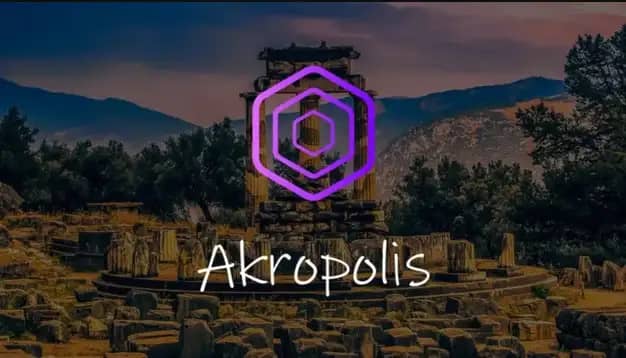Akropolis
아크로폴리스는 DeFi(탈중앙화 금융) 프로토콜입니다. 아크로폴리스 제품을 통해 사용자는 수익성 있는 탈중앙화 자율 조직(DAO)을 시작 및 확장하고, 담보 부족 대출을 이용하고, 곡물 수익률을 얻고, 통합 프로토콜/풀에서 토큰을 획득할 수 있습니다. 이 플랫폼의 AKRO 암호화폐 토큰은 이더리움 플랫폼 위에 구축되었습니다[1][2].
2020년 11월, 아크로폴리스는 파생 상품 플랫폼 dYdX의 플래시 대출을 활용한 재진입 공격으로 2백만 달러의 손실을 입었습니다. 11월에 아크로폴리스와 yEarn 팀은 합병을 발표했습니다.
개요
아크로폴리스는 사람들이 지리, 중앙 상대방 또는 전통적인 금융 관행에 의존하지 않고 안전하게 미래를 위해 저축, 성장 및 조달할 수 있는 도구를 제공하는 것을 목표로 합니다. 이를 위해 아크로폴리스는 사용자 정의 가능한 사용자 인센티브, 본딩 커브 메커니즘으로 활성화된 자동화된 유동성 제공, 프로그래밍 방식의 유동성 및 재무 관리를 통해 수익성 있는 DAO를 생성하기 위한 프레임워크인 AkropolisOS를 구축했습니다[4][5][10].
제품
AkropolisOS
AkropolisOS는 분산된 디지털 금융 조직을 생성하고 관리하기 위한 프레임워크입니다. 누구나 AkropolisOS를 사용하여 사용자 정의 가능한 사용자 인센티브, 본딩 커브 메커니즘으로 활성화된 자동화된 유동성 제공, 프로그래밍 방식의 유동성 및 재무 관리를 통해 분산된 자본 풀을 설정하고 공동으로 관리할 수 있습니다. OpenZeppelin을 기반으로 한 업그레이드 가능한 모듈식 프레임워크로 설계된 AkropolisOS는 일관성 및 보안 손실 없이 레고와 같은 확장성을 제공합니다.
스파르타
스파르타는 AkropolisOS를 기반으로 한 담보 부족 신용 풀로, 회원은 다른 회원에게 담보 부족 대출을 제공하고 다양한 유동 DeFi(탈중앙화 금융) 상품을 통해 자본을 풀링하고 투자하여 높은 이자율을 얻을 수 있습니다.
델파이
델파이는 AkropolisOS에 구축된 풀입니다. 달러 비용 평균화 도구가 있는 수익률 파밍 애그리게이터입니다. 델파이를 통해 사용자는 합성 저축에 대한 수익률을 얻고, 통합 프로토콜/풀에서 토큰을 획득하고, 적극적인 "올인" 접근 방식 또는 수동적인 달러 비용 평균화 전략을 사용하여 변동성이 큰 자산에 투자할 수 있습니다.
토큰노믹스
아크로폴리스 기본 토큰(AKRO)은 본딩(스테이킹)에 사용되며 Dpos(위임 지분 증명)로 작동하는 AkroChain 컨센서스에 사용자 참여에 필요합니다. AKRO 토큰의 다른 기능은 네트워크 거버넌스 참여 및 대출 유치 시 담보로 사용하는 것입니다[[13]](#cite-id-ybh1i4cgpld].
AKRO는 검증인으로서 AkroChain 컨센서스에 참여하는 데 사용됩니다. 각 검증인은 토큰을 본딩(스테이킹)해야 합니다. 최소 스테이크는 미리 정의된 수의 노드만 네트워크를 검증하고 다른 노드는 지명자로 서도록 자동으로 정의됩니다. 초기 검증인 수는 아크로폴리스 팀에서 설정하며 토큰 보유자의 투표로 변경할 수 있습니다. 모든 AKRO 보유자는 블록 생산에 참여할 수 있습니다. 블록 생산자에 대한 보상은 원장 계층의 거래 수수료와 시장 계층에서 부과되는 수수료의 합계입니다. 검증인의 부정직한 행동의 경우 토큰이 삭감됩니다.
2019년 8월, CertiK는 AKRO 토큰의 스마트 계약에 대한 감사 결과를 발표했습니다. 이 감사는 공식 검증과 보다 전통적인 "수동" 감사라는 두 가지 방법으로 구성되었습니다. CertiK 팀은 다음과 같이 보고했습니다.
전반적으로 CertiK는 아크로폴리스 프로토콜 스마트 계약이 좋은 관행을 따르는 것으로 확인했습니다. 소스 코드의 최종 업데이트 및 감사 보고서 전달과 함께 계약이 구조적으로 건전하고 고전적으로 알려진 안티 패턴 또는 보안 문제에 취약하지 않다고 결론지었습니다.
아크로폴리스의 토큰노믹스에는 두 개의 토큰이 더 관련되어 있습니다. ASPT는 스파르타 풀의 ERC-20 토큰이고 ADEL은 델파이 제품의 ERC 토큰입니다. ASPT는 유틸리티 및 거버넌스 기능을 결합한 네트워크 토큰으로 분류됩니다. 거버넌스 측면에서 이자율, 본딩 커브 매개변수, 대출 담보 비율 등과 같은 스파르타 풀 매개변수의 변경에 투표할 권한을 부여합니다. 유틸리티 토큰으로서 ASPT는 보유자에게 담보 부족 대출을 받을 권한을 부여합니다. 이는 사용자가 대출 금액의 50% 이상을 ASPT로 약정하고 사용자를 좋은 차용인으로 간주하는 풀 회원이 추가 담보로 ASPT 토큰을 잠그는 '커뮤니티 보조금' 접근 방식을 통해 작동합니다. 담보화된 ASPT의 합계가 요청된 대출 규모와 같으면 차용인은 스테이블코인(DAI, Tether, TrueUSD, USD Coin)으로 대출을 받고 커뮤니티 대출 기관은 이자의 일정 비율을 받습니다. 이 이자 공유 모델은 풀 회원이 시스템에 적극적으로 참여하고 다른 사용자에게 담보를 제공하여 이익을 얻을 수 있도록 보장합니다. ASPT의 가치는 DAO에 보유된 자산에 연결되어 있으며 스테이블코인이 입금되거나 인출될 때마다 ASPT가 발행되거나 소각됩니다.
ADEL은 델파이에서 유동성 채굴을 통해 배포되는 거버넌스 토큰입니다. 플랫폼에 대한 거버넌스 권한을 부여하고 YFI에서 영감을 받은 공정한 배포로 출시할 예정입니다.
재진입 공격
2020년 11월, 아크로폴리스는 아크로폴리스 설립자 겸 CEO인 Ana Andrianova에 따르면 파생 상품 플랫폼 dYdX의 플래시 대출을 활용한 재진입 공격으로 2백만 달러의 손실을 입었습니다. 공격자는 The Block 연구원 Steven Zheng과 Andrianova에 따르면 프로젝트의 yCurve 및 sUSD 풀에서 50,000달러의 DAI를 인출했습니다. 공격자는 풀을 소진하기 전에 2백만 달러 상당의 스테이블코인을 수집했습니다.
아크로폴리스는 나중에 웹사이트에 성명을 발표하여 "대부분의 자금"이 안전하고 모든 스테이블코인 풀을 일시 중단할 것이라고 밝혔습니다. 회사는 영향을 받은 사용자에게 상환할 "방법을 모색"하고 있다고 덧붙였습니다.
Medium에 게시된 공개 서한에서 플랫폼은 해커의 협력에 대해 200,000달러의 "보상"을 제안했습니다. Akropolis는 버그 현상금 지불을 "당신의 악용에 대한 보상으로" 설명하면서 "해커가 우리의 제안을 고려하고 문제를 해결하기 위해 팀과 협력하기를 바랍니다."라고 말했습니다. Akropolis는 "48시간 이내에 커뮤니티 회원의 자금을 반환해 주시면 그 대가로 200,000달러의 버그 현상금을 제공할 것입니다."라고 말했습니다. "필요에 따라 귀하의 신원을 보호하기 위한 조치를 취할 것입니다. 협력하지 않기로 결정하시면 형사 소송을 제기하고 법 집행 기관에 연락할 것입니다." 2020년 11월 17일 현재 편지가 있는 Medium 게시물이 삭제되었습니다.
사이버 공격 이후 아크로폴리스는 내부적으로 악용을 조사하고 있으며 현재 "계약 수준" 문제를 수정하고 있습니다. 회사는 또한 파트너 및 투자자와 함께 사건에 대한 외부 분석을 시작했습니다. 11월 16일 프로젝트 업데이트에서 아크로폴리스는 위협 행위자가 "SavingsModule 스마트 계약의 결함 있는 예금 논리 처리"를 악용할 수 있었다고 밝혔습니다. 회사는 "악용으로 인해 가치 있는 자산으로 뒷받침되지 않은 많은 풀 토큰이 발행됩니다."라고 덧붙였습니다.
yEarn 합병
2020년 11월, 아크로폴리스와 yEarn 팀은 합병을 발표했습니다. 보도 자료에 따르면 두 프로젝트는 서로의 강점을 활용하기 위해 합병하여 서로 "가장 잘하는 일을 할 수 있도록" 할 것입니다[15][[16]](#cite-id-picz2i65j1g].
아크로폴리스는 yEarn 볼트 기술을 통합하고 볼트 V2 플랫폼에 수익률 파밍 전략을 게시할 것입니다. 아크로폴리스는 또한 2020년 11월 해킹으로 인한 손실을 추적하기 위해 IOU 토큰(iouAKRO)을 도입할 것입니다. 플랫폼 이익은 이 토큰의 기금으로 리디렉션되어 결국 해킹으로 돈을 잃은 모든 사람에게 상환됩니다. 팀은 더 많은 사용자가 미래에 보상 혜택을 누릴 수 있도록 보험 프로토콜과의 통합을 간소화할 것이라고 말했습니다. 아크로폴리스는 또한 yEarn, Pickle Finance 및 Cream Finance 제품에 액세스할 수 있습니다.
yEarn의 경우 프로토콜은 아크로폴리스의 기관 연락처 및 비즈니스 개발 수완의 혜택을 누릴 수 있습니다. 아크로폴리스는 또한 수익률 파밍과 관련이 없는 두 제품인 스파르타와 아크로폴리스OS를 폐기하기로 약속했습니다. 두 제품 모두 오픈 소스 개발 모델로 이동하여 두 회사의 새로운 생태계에 전문 트레이더가 액세스할 수 있도록 하는 프런트 엔드에 집중할 것입니다.
팀
- Anastasia Andrianova(CEO 겸 설립자)
- Kate Kurbanova(공동 설립자, 운영 및 인력)
- Alex Maz(기술 리드)
- Pavel Rubin(Solidity 개발자)
- Dima Serd(프런트엔드 리드)
- Yana Mar(커뮤니티 및 마케팅)
자문위원
- Bokky Poobah(블록체인 보안 감사관)
- Peter Robertson(연금 및 보험 자문위원)
- Prabhakar Reddy
- Maria Paula Fernández(외부 커뮤니케이션 및 홍보)
- Laura Toma(마케팅 자문위원)
파트너
- MakerDAO
- Polkadot
- Web3 Foundation
- ChainX
- ChainLink
- Wyre
- POA
- Cindicator
- Bancor
- Kenetic
- Zerion
- CertiK
- Aurum Law
- MixBytes EOS BP
- Messari Crypto
